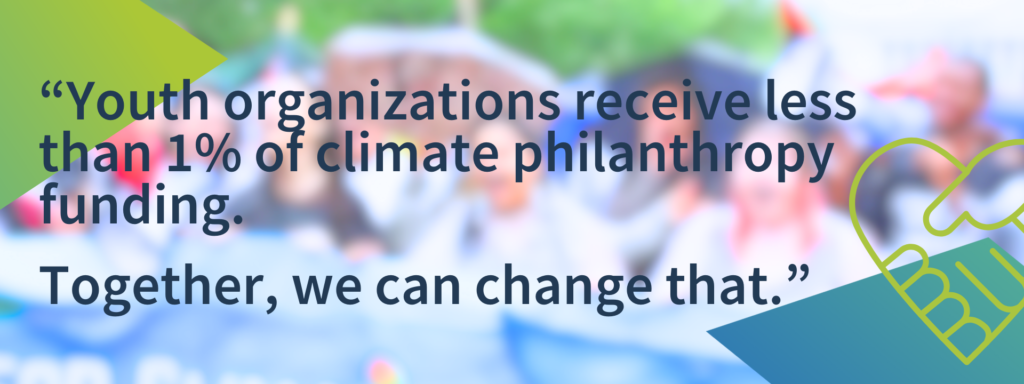Raising Ambition for Youth Engagement at COP29
Last year, Student Energy and the Climate Emergency Collaboration Group came together at COP28 to facilitate a collaborative roundtable event, uniting youth and philanthropic actors to address the challenges and opportunities inherent in engaging youth-led organizations in the energy sector while building meaningful partnerships.
The pivotal role of youth in steering the global energy transition has become increasingly apparent. Recognizing the urgency of engaging the next generation of leaders, philanthropic organizations have separately expressed interest in providing further support to youth-led organizations and initiatives in the energy sector. However, despite this commitment, youth-led initiatives receive less than 1% of funding from climate philanthropy. Additionally, there remains a gap in understanding the most effective ways for philanthropies to actively and meaningfully engage with youth-led organizations.

To address this challenge, Student Energy and the Climate Emergency Collaboration Group came together at COP28 to facilitate a collaborative roundtable event, uniting youth and philanthropic actors to address the challenges and opportunities inherent in engaging youth-led organizations in the energy sector. These conversations emphasized the importance of flexible, unrestricted funding to support the long-term sustainability of youth organizations while facilitating greater participation in global decision-making spaces; dismantling exclusionary barriers present within current grant-making processes; and recognizing the unique needs and challenges facing youth, prioritizing support for youth efforts across ages, geographies, and backgrounds.
As we look towards this year’s COP convenings, which will be taking place between November 11 and 22, 2024, in Baku, Azerbaijan, we’re diving into a few key takeaways from this discussion while calling on leaders across all sectors to raise ambition around their youth engagements – a demographic that will be critical to achieving an equitable and sustainable energy future for all. We further hope these findings will catalyze broader gatherings and youth-philanthropy engagements to spur the global energy transition through innovative and impact-driven youth initiatives.
Flexible, unrestricted funding is essential.
Many youth participants noted that they often have difficulties accessing funding through philanthropies that support multi-year projects or general organizational needs, instead relying on project-specific grants.

Not only can flexible, unrestricted funding support the long-term sustainability of youth organizations, but a number of additional co-benefits can be realized. Sufficient funding towards organizational salaries can help to reduce burnout common across youth organizations, many of which are volunteer-based. Funding allocated toward travel can facilitate increased youth participation in critical global decision-making spaces, such as COP28, which can be vital for inspiring future work and initiatives. Unrestricted funding can also serve to support educational and people development opportunities, furthering young people’s capacity to undertake this critical work and enhancing their overall credibility as actors in the energy space.
Philanthropy must work to dismantle barriers that are exclusionary to youth.
Youth organizations expressed that they generally find the philanthropic space to be exclusionary, difficult to navigate, and often operating in elite circles of which they are not a part.

Philanthropic organizations must acknowledge the current barriers that may restrict youth organizations from accessing grants. These barriers might include the use of difficult or jargon-filled language, bureaucratic and time-consuming application processes, and funding requirements that render youth-led work ineligible due to fewer years of experience and a perception that youth lack the necessary expertise to undertake such work. Young people have identified trust between youth organizations and philanthropy as a critical first step toward dismantling these barriers.
Philanthropy must be cognizant of the unique needs and challenges facing youth.
Youth organizations are operating across incredibly diverse geographies, undertaking initiatives that are geared toward specific contexts and needs. In some parts of the world, youth feel restricted from grants due to ongoing conflict or political polarization.

To raise ambition around youth engagement in the energy sector, philanthropies should prioritize supporting youth efforts across ages, geographies, and backgrounds while avoiding tokenistic and superficial efforts. Increasingly important is the need to recognize the unique context surrounding Indigenous-led initiatives while encouraging funding to support the integration of Indigenous knowledge into policy and practice.
This lack of access to philanthropic funding can inevitably restrict youth organizations’ ability to maintain and scale their operations within the energy sector. This roundtable and its findings provide evidence-backed starting points to increase awareness among climate philanthropists of the needs of young entrepreneurs in the energy sector, ultimately spurring the global energy transition through innovative and impact-driven partnerships.